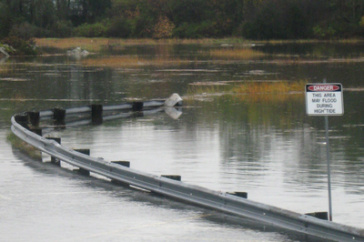Carsey Institute: Private Health Insurance Coverage Rates for Children Continue to Decline as Families Struggle with Recession

Photo of inundated road by Roger Stephenson courtesy of Piscataqua Region Estuaries Partnership's "2011 King Tide Photo Contest."
DURHAM, N.H. - Rates of private health insurance coverage for children continue to decline as families shift to public health insurance plans, with the South seeing the largest increase in public health insurance coverage of children, according to new research from the Carsey Institute at the University of New Hampshire.
The trend is particularly pronounced in inner-city and rural areas, which traditionally have had lower coverage rates than suburban areas.
The key findings of this research show:
- Nationally, private health insurance for children decreased by just under two percentage points, while public health insurance increased by nearly three percentage points.
- Rural places and central cities witnessed significant declines in rates of private health insurance for children in nearly every region. Rates of public insurance coverage rose in every region and place type.
- Between 2009 and 2010, 39 states plus Puerto Rico saw declines in rates of private health insurance coverage for children. In 35 of those states and Puerto Rico, rates of children's public insurance increased during the same period.
- Children's health insurance coverage overall continued to rise in 2010, increasing by 0.6 of a percentage point since 2009, and 1.9 percentage points since 2008.
"With unemployment still high, our research suggests that many families may no longer have private employer-based insurance. It is also likely that many parents are no longer working the same types of jobs since the recession, and may now be working part time or in a different sector. This change in the labor market may leave dependent children ineligible for private coverage," the researchers said.
"In addition, employers continue to look for ways to reduce costs, including offering fewer benefits to employees. Therefore, families may be enrolling their children in public insurance because enrollment in a private plan is no longer an option," they said.
The research was conducted by Michael Staley, doctoral student in sociology at UNH and a research assistant at the Carsey Institute; Jessica Bean, vulnerable families research associate at the Carsey Institute; and Jessica Ulrich, doctoral student in sociology at UNH and a research assistant at the Carsey Institute.
Public health insurance for children is provided principally through Medicaid and the State Children's Health Insurance Program (SCHIP). Such public insurance programs have faced deep cuts at the state level, and at the federal level, there is talk of offsetting cuts in military spending with potential significant cuts to human service programs, which might include cuts to these programs.
"As the expense of care continues to rise, legislators, insurers, and health care professionals should consider alternative measures for reducing health care costs, such as renegotiating reimbursement rates for providers and reducing the cost of pharmaceuticals, thereby slowing the rise of private health care premiums. Such measures may also slow the increasing rates of enrollment in public insurance," the researchers said.
The complete report about this research, "Rates of Public Health Insurance Coverage for Children Rise as Rates of Private Coverage Decline," is available at http://carseyinstitute.unh.edu/CarseySearch/search.php?id=181.
This research is based upon U.S. Census Bureau estimates from the 2008, 2009, and 2010 American Community Survey.
The Carsey Institute conducts policy research on vulnerable children, youth, and families and on sustainable community development. The institute gives policy makers and practitioners the timely, independent resources they need to effect change in their communities. For more information about the Carsey Institute, go to www.carseyinstitute.unh.edu.
The University of New Hampshire, founded in 1866, is a world-class public research university with the feel of a New England liberal arts college. A land, sea, and space-grant university, UNH is the state's flagship public institution, enrolling 12,200 undergraduate and 2,300 graduate students.
-30-
Editors and Reporters: Jessica Bean, research associate at the Carsey Institute, can be reached at 603-862-3215 and mailto:jessica.bean@unh.edu"
Latest News
-
July 2, 2024
-
June 18, 2024
-
June 18, 2024
-
May 17, 2024
-
May 14, 2024

















































